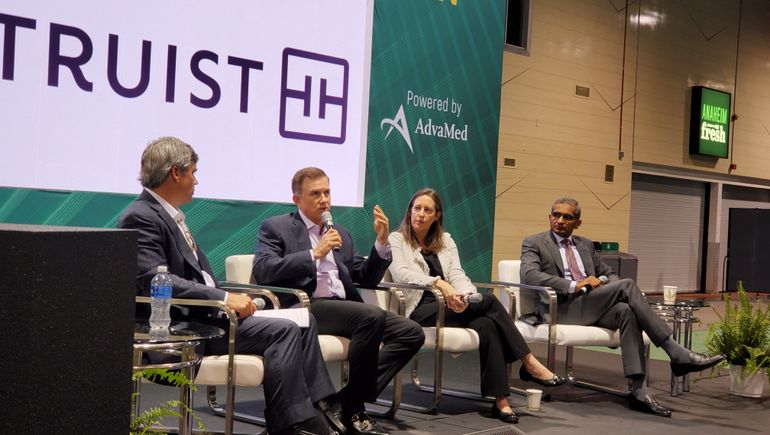Rising interest rates and market volatility have put a damper on mergers and acquisitions. Large purchases have been few and far between, with most medical device firms favoring smaller acquisitions or spinoffs.
Medical device executives with Medtronic, Zimmer Biomet and Smith & Nephew expect M&A will pick up in the long term. In the short term, however, they face challenges in discussions about valuations, or are focusing on other priorities, they said at the MedTech Conference in Anaheim, California, this week.
Here are four takeaways from the discussion:
1. Executives expect M&A to return in the long term
“I’m probably one of the more bullish that it starts to come back,” said Rachel Ellingson, Zimmer Biomet’s chief strategy officer. “I’m a believer that larger companies need growth at their core … at the size and scale that actually moves the needle. And I think without acquisitions that’s really hard to do.”
Smith & Nephew CEO Deepak Nath also expressed optimism over the long term, but said that he does not expect many acquisitions in the back half of the year as the company works to turn around its orthopedics business, which makes up roughly 40% of its total revenue.
“We’ve got a particular set of circumstances for us that paces how we look at near-term M&A,” he said.
Medtronic CEO Geoff Martha said the amount of money the company spent on M&A in its 2023 fiscal year is in line with pre-COVID trends. But the count of deals is lower.
“For a variety of reasons,” Martha said, the company is looking to do fewer deals that will be more impactful in the short term on the company’s profits.
“And so that raises the valuation of it, and they’ve got revenue,” he added.
2. Fluctuating valuations make acquisitions more difficult
The decline in the public markets has resulted in medtech valuations falling from their 2021 highs. However, that doesn’t mean companies are prepared to sell at those prices.
“Valuations have taken a pretty big hit,” Martha said, adding that there’s “a lot of volatility” in the market.
“Some of the targets we would look at, they’re saying, ‘Hey, this isn’t our valuation,’’ Martha said.
The market swings do have an impact, although Medtronic tends to take a long-term view of its purchases, he said.
“When you’re looking at an asset for a long period of time and trying to understand that strategic fit, a little up or down isn’t going to dramatically change your decision,” Martha said.
3. Private companies are more open to conversations
Interest rates are also affecting the valuations of privately held companies, but sometimes they can be more open to discussion, Ellingson said.
“Sometimes you can actually get to fundamental value and have that conversation in a way you can’t always have with public companies, especially if they’ve fallen pretty significantly,” she said.
Privately held companies also need to factor in their cash position, and the lack of an IPO market. They may choose to sell rather than take on diluted financing or wait for the IPO window to open, Ellingson added.
4. Why they think spinoffs were the right strategy
Martha explained how the company struck a joint venture between its renal care solutions business and DaVita, launching a new company called Mozarc Medical.
Medtronic currently has “too many” exciting investment opportunities, Martha said, listing soft tissue robots, diabetes technology, structural heart and “hopefully renal denervation” as examples. Another is home dialysis technology.
“We just didn’t think at the end of the day we were the best ones to bring that to market,” Martha said. “We don’t have a channel for that. And it just wasn’t as core.”
They found that DaVita would be a better partner to commercialize the technology.
Ellingson also talked about Zimmer Biomet’s decision to spin out its spine and dental businesses into ZimVie last year.
“Sometimes those businesses that are non-core or lower-growth areas don’t get as much capital, which then continues the vicious cycle of they’re not getting the investment always that they deserve,” she said. “So then you get to a place where you have to say, ‘Are we the right owner, or is someone else a better owner, or are they better off on their own?’”
The company chose a spinoff instead of other types of divestitures because there’s no counterparty to negotiate against, you don’t have to do multiple transactions and it can be a tax-efficient vehicle to create value for all stakeholders, Ellingson said.

